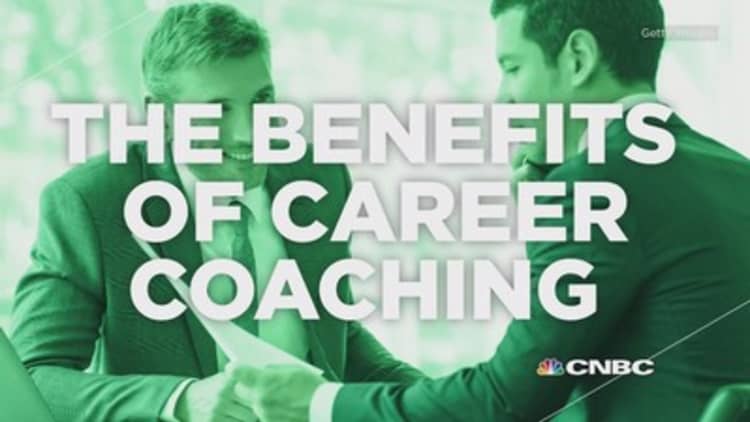
Before officially launching her new business last month, Anne Marie Segal of Stamford, Connecticut, already started working with a couple dozen clients.
Among other things, Segal helped one client discern that her LinkedIn photo was too provocative and another client realize her résumé portrayed her as a risky corporate hire.
All in a day's work for a career coach.
"It's about managing the client's own message in their own way and on their terms," said Segal, owner of Segal Coaching.
Segal, who spent 15 years as an attorney, has joined the ranks of a niche profession known as career coaching.
A career coach "will help someone get clarity of what their career or job [goals] are, help establish a plan … and be a partner in that journey," said Magdalena Mook, executive director and CEO of the International Coach Federation.
The types of things that career coaches help clients with can range from tactical actions, such as helping someone create a greater presence on social media, to more emotional/individual issues, like helping workers improve their work-life boundaries.
Read MoreWill baby boomers ever retire?
Although the national average hourly charge for a career coach is $215, the ICF cautions that the rate you will pay depends on where you live. In a high-cost city such as New York, the hourly charge might be $500. In a small town somewhere, that amount might be $100.
Mook said that before hiring a coach, you should talk to at least two or three coaches to ensure you decide on one who is a good match, with a strong level of trust in the coach's process.
The easiest way to find a coach is to go to the ICF website at Coachfederation.org. Through the site's Coach Referral Service, you can cull from the group's membership based on criteria you input.
The more complicated your situation—i.e., you hate your job but have zero clue what you'd rather do—the more time you can expect to spend with your coach, which will result in a greater expense.
Questioning career paths
Donna Sweidan, founder of CareerFolk, said she has had many clients who have reached a point in their life where they begin to question their career.
"As people grow older, the meaning of success can change," Sweidan said. "Some people find out they are stuck in a job. They kind of need to check in, to reassess where they are."
Read MoreTips for out-of-work job seekers
Sweidan, who not only is a career coach but a licensed mental health counselor, helps clients through any emotional barriers that are holding them back, then helps them tackle the tactical components of a goal-oriented plan.
"I work in a holistic manner," she said. "I'm wearing my coaching hat and counseling hat always."

Sometimes clients' goals can be unrealistic, such as trying to break into a tough business, like, say, the music industry.
"I never try to discourage them, but it is important to help them create a realistic outlook," she said. "I get them to look at the field they are interested in and get a pretty good pulse on what's going on."
A 2012 ICF study estimates 47,500 professional coaches of all stripes exist worldwide, generating a combined $2 billion in annual revenues.
A few years since that study, it remains a small industry. But Mook said that 10 years ago ICF membership was about 8,000. Now it stands at 26,000. That number includes coaches with a variety of specialties, not just career coaches.
Read MoreWhat every freelancer should know
Of the ICF membership, about 40 percent—or more than 10,000 members—are in the U.S. Of them, just 7 percent call themselves career coaches. However, not all career coaches are members of the ICF.
Also, their backgrounds are as varied as their expertise. Some come from years spent in specific industries, while others come from counseling or teaching backgrounds.
Because of their backgrounds, many career coaches specialize in certain industries. Segal at Segal Coaching, for instance, is targeting attorneys, entrepreneurs and executives.
Other career coaches focus on certain demographics, such as women or younger workers.
In Segal's case, while working as an attorney, she had worked with career coaches herself. One of them was Sweidan of CareerFolk, who was a longtime acquaintance.
In December, Segal said, the two met for lunch to catch up. Segal told her lunch partner that she'd been thinking about becoming a career coach herself.
"She said she thought I'd be good at it," Segal said.
So with Sweidan's stamp of approval, Segal's first move was to get training so she could learn more about the profession and also be certified.
Read MoreBest and worst cities for new careers
Being credentialed, along with belonging to a professional organization, is something that people should look for in a career coach, said the ICF's Mook.
The ICF requires that professionals earn certification as a trained coach before they can join. Once a member, there is a code of ethics they must abide by.
And, Mook said, the organization serves as a starting place for client complaints.
"If the individual is not satisfied with the relationship, there is a process for filing a complaint to make sure the [coach is sticking to] the code of ethics," Mook said.
She also said a typical coaching engagement will last three months, with four or five appointments during that time. But not all coaching relationships are the same.
Coaching is not remedial. It is not about fixing problems.The coach helps get you from where you are now to where you want to be.Magdalena Mookexecutive director and CEO of the International Coach Federation
"Some people have no idea where to start," Mook said. "Other people might seek out a coach and just need one little push" to move toward where they want to be.
"Coaching is not remedial. It is not about fixing problems," Mook said. "The coach helps get you from where you are now to where you want to be."
—By Sarah O'Brien, special to CNBC.com





